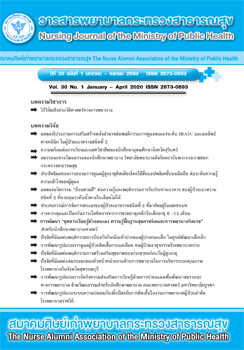Historical Research Methodology in Nursing
Main Article Content
Abstract
Historical research is a research process that helps researchers understand past events in order to better understand the present and future events. Conducting historical research in nursing is uncommon, since some scholars consider it as only data collection and organization but not research. However, other scholars are aware of its value and have founded associations in many countries. There are very few nursing researchers employing historical research methodology in Thailand. The purpose of this article is to present the basic tenets of historical research methodology, its critiquing guidelines, and potential scope for future historical research in nursing.
Article Details
บทความและรายงานวิจัยในวารสารพยาบาลกระทรวงสาธารณสุข เป็นความคิดเห็นของ ผู้เขียน มิใช่ของคณะผู้จัดทำ และมิใช่ความรับผิดชอบของสมาคมศิษย์เก่าพยาบาลกระทรวงสาธารณสุข ซึ่งสามารถนำไปอ้างอิงได้
References
2. Thaveelap V. History and revolution of Thai nursing (1896-1987). Bangkok: Wattanakit; 2007. (in Thai)
3. Lewenson S, McAllister A, Learning the historical method: Step by step. In: de Chesnay M, an editor, Nursing research using historical method: Qualitative designs and methods in nursing. New York: Springer Publishing Company; 2015.
4. Thaweeboon T, Peachpansri S, Pochanapan, S, Senachack P, Pinyopasakul W. Development of the School of Nursing, Midwifery, and Public health at Siriraj, Thailand 1896-1971: A historical study. Nursing and Health Science 2011;13(4):440-6.
5. American Association for the History of Nursing (AAHN). About AAHN [internet]. 2019 [cited 2019 June 4]. Available from https://www.aahn.org/about-us
6. Lewenson SB. Historical research in nursing: A current outlook. In: Beck CT. an editor, Routledge
international handbook of qualitative nursing research. New York: Routledge; 2013.
7. Laksana K. Historical thinking development: Thinking about historical significance. Journal of Liberal Art, Ubon Ratchathani University 2016;12(2):137-58. (in Thai)
8. de Chesnay M. (an editor). Nursing research using historical method: Qualitative designs and methods in nursing. New York: Springer Publishing Company; 2015.
9. D’Antonio P, Fairman JA, Whelan, JC (editors). Routledge handbook on the global history of nursing. London: Routledge, Taylor & Francis Group; 2013.
10. de Souza Costa K, Fernandes de Freitas G, Hagopian, EM. Men in nursing: Academic education after graduation and professional trajectory. Journal of Nursing UFPE / Revista de Enfermagem UFPE online 2017;11(3):1216-26.
11. Alves Benedet S, Itayra Padilha M, Lima Gelbke F, dos Reis Bellaguarda ML. The model professionalism in the implementation of the nursing process (1979-2004). Revista Brasileira de Enfermagem 2018; 71(4):1907–1914. doi.org/10.1590/0034-7167-2017-0226.
12. Streubert HJ, Carpenter DR. Qualitative research in nursing: advancing the humanistic imperative. Philadelphia: Wolters Kluwer; 2011.
13. Sontichai P. Nursing education leader’s vision: the case study of associate professor Vichien Thavilap, Ph.D. [Master Thesis]. Bangkok: Chulalongkorn University. 1997. (in Thai)
14. Kiatkanon K. Evolution ofmissionary roles in providing nursing science programs in Thai higher education institutions [Doctor dissertation]. Bangkok: Chulalongkorn University. 2009. (in Thai)
15. Kongsuwan W, Keller KB, Chase SK. Evolution of caring for dying patients in intensive care units in the United States from 1960-1980. International Journal for Human Caring 2016,20(1):2–7. doi.org/ 10.0467/1091-5710.20.1.2
16. Nuanpian P. Gray zone in the red field: Reflection on free area surrounding Bantad hillside villages during the Cold war. Rusamilae Journal 2018;39(3):7-20. (in Thai)
17. Kacharat S. From “health” to “well-being”: The health system reform of Thailand public health. Veridain E-Journal, Silapakorn University (Humanities, Social Sciences and Arts)2017;10(2):2803-19. (in Thai)

